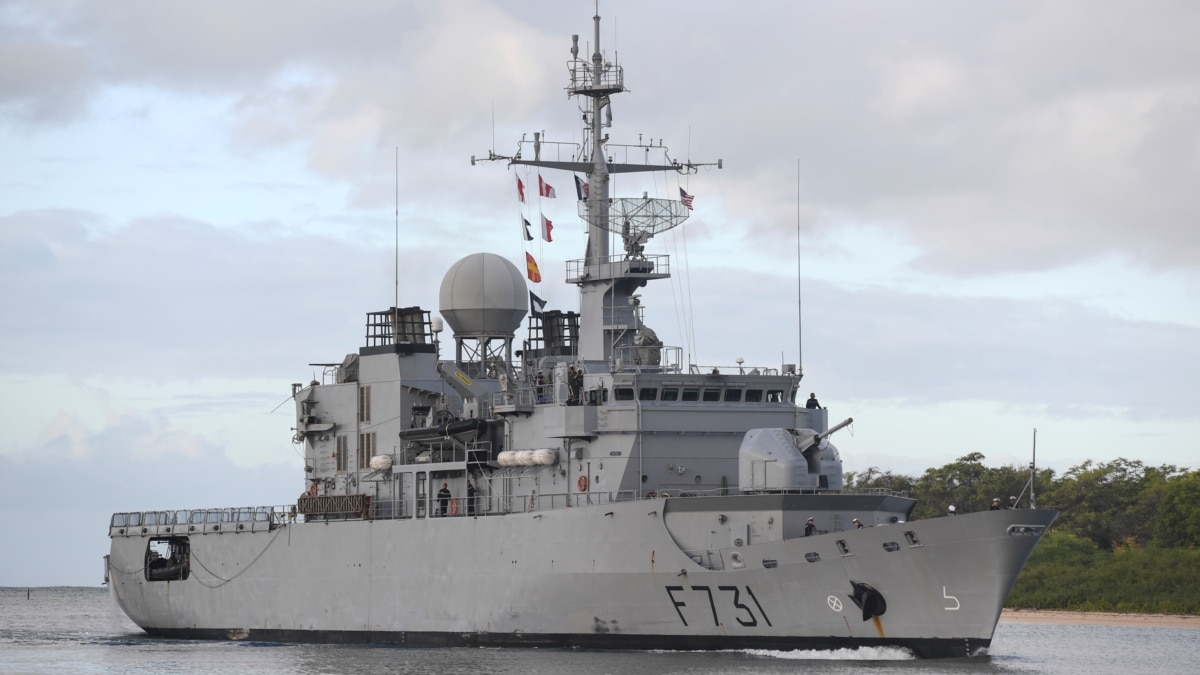France sent a naval vessel near the Korean Peninsula to monitor violations of UN Security Council sanctions against North Korea. Recently, not only Indo-Pacific countries such as Australia and New Zealand, but also North Atlantic Treaty Organization (NATO) member countries such as Germany and the UK are participating. Let’s find out more with reporter Kim Si-young.
Host) First, please briefly explain France’s current activities.
Reporter) Yes, the French Navy frigate ‘Préreal (F 731)’ has been monitoring illegal maritime activities such as ship-to-ship transfers with North Korean ships, which are prohibited by UN Security Council resolutions, in waters around Japan from the end of last month until recently. The mission was carried out.
Japan’s Ministry of Foreign Affairs said this in a press release dated the 25th, explaining that this is the sixth time since 2019 that a French naval vessel has participated in activities to monitor the implementation of Security Council sanctions against North Korea.
host) okay. What were the activities of the French military in the past?
Reporter) Previously, France sent one of its navy’s F-200 maritime patrol aircrafts to the Korean Peninsula from mid-last month to early this month to conduct maritime surveillance activities.
At a time that partially overlapped with the period of the Prairie’s activities, surveillance of French naval assets was carried out from the air, and Japan’s Ministry of Foreign Affairs explained at the time that this was the fifth time since 2019 that aircraft were dispatched.
In addition, France has also undertaken monitoring activities for violations of sanctions against North Korea in October and April of last year and in October and April of 2023.
Host) Not only France but other NATO allies have recently joined in this surveillance activity?
Reporter) That’s right. The most recent example is the activities of the Canadian Navy frigate HMCS Vancouver (FFH 331), which performed related missions in waters around Japan from early to mid-month.
In addition, the Royal Navy patrol ship HMS Spey conducted surveillance in waters around Japan from mid-June to late June for illegal maritime activities, such as ship-to-ship transfers with North Korean-flagged ships, which are prohibited by UN Security Council resolutions.
In addition, the German Navy’s frigate ‘BADEN-WÜRTTEMBERG’ and supply ship ‘FRANKFURT am MAIN’ conducted surveillance activities from late August to mid-September.
In particular, among NATO member countries, countries participating for the first time this year are also attracting attention.
Last August, the Italian Navy’s multipurpose combat ship ‘Raimondo MONTECUCCOLI∙P 432’ and in May, the Netherlands Navy’s frigate ‘TROMP’ joined this surveillance activity for the first time.
host) What is the background to NATO allies’ active participation in North Korea’s illegal transshipment surveillance activities?
Reporter) Yes, it appears to be due to a change in perception that violations of UN Security Council sanctions against North Korea, such as illegal ship-to-ship transfers that could lead to North Korea’s production and expansion of weapons of mass destruction (WMD), including nuclear weapons, can pose a direct threat to European security.
Experts also say that Russia’s invasion of Ukraine also influenced European countries’ participation in sanctions monitoring activities against North Korea.
This is because North Korea’s support for Russia’s war poses a direct threat to European countries and NATO.
In addition, there is an analysis that the reason European countries have become more active is because they are recognizing the need for more thorough surveillance after the disbandment of the expert panel under the UN Security Council’s North Korea Sanctions Committee in April.
host) What is the international legal basis for these activities?
Reporter) The UN Security Council adopted Resolution 2375 on North Korea in September 2017 in response to North Korea’s sixth nuclear test. The main content of this resolution is to prohibit ship-to-ship transshipment with North Korean ships in order to prevent the smuggling of North Korea’s embargoed items such as coal, oil, and seafood.
It can be said that such surveillance activities by the international community have been carried out based on this.
host) Meanwhile, North Korea has strongly opposed these surveillance activities that are continuing around the Korean Peninsula?
Reporter) Yes, when France’s surveillance activities began early last month, North Korea issued a statement on the 6th of last month in the name of Ryu Gyeong-cheol, a researcher at the Korea-Europe Association, saying, “Under the pretext of implementing the Security Council’s resolution on sanctions against North Korea, it has been pushing its military force into the waters of the Korean Peninsula every year since 2019. “France’s attempt to intensify tensions carries great risk,” he argued.
Prior to this, in May of this year, when the Netherlands embarked on its first mission, a statement by the head of the Foreign Policy Office of the North Korean Ministry of Foreign Affairs said, “Recently, the UK, Canada, France, and New Zealand have sent warships and military aircraft to the waters around the Korean Peninsula and the Asia-Pacific region to reduce military tension in the region. “It is escalating,” he claimed.
I’ll listen to it here. We learned about the continued participation of NATO member countries such as France, Germany, and the United Kingdom in the Security Council’s sanctions monitoring activities against North Korea.
Given North Korea’s history of sanctions violations, how effective can UN Security Council resolutions alone be in curbing its nuclear ambitions, and what alternative strategies might be more fruitful?
## Interview: NATO Involvement in North Korean Sanctions Monitoring
**Participants:**
* **Dr. Emily Carter:** Associate Professor of International Relations, specializing in Northeast Asian security.
* **Captain James O’Connell:** Retired U.S. Navy Captain with extensive experience in maritime security operations.
**Moderator:** Welcome to the program. Today we’re discussing the recent uptick in NATO member participation in monitoring UN sanctions against North Korea. Joining us are Dr. Emily Carter and Captain James O’Connell.
**Section 1: Motivations behind Increased NATO Involvement**
**Moderator:** Let’s start with the core issue: What factors are driving NATO allies to become more involved in the surveillance of North Korea’s maritime activities? Dr. Carter, your expertise lies in Northeast Asian security dynamics. Can you shed some light on this?
**Dr. Carter:**
**(Open-ended question for Dr. Carter):** How much of the increased NATO involvement is a direct response to North Korea’s nuclear provocations versus a broader shift in how the international community views the broader security challenges emanating from North Korea?
**Moderator:** Captain O’Connell, your experience provides valuable insight into maritime security operations.
**(Open-ended question for Captain O’Connell):** What are the unique challenges and considerations involved in conducting surveillance missions in the waters around the Korean Peninsula?
**Section 2: Legal and Operational Aspects**
**Moderator:** The article cites UN Security Council Resolution 2375 as the legal basis for these surveillance activities. Dr. Carter, how effective are these resolutions in deterring North Korea, given its previous track record of violating sanctions?
**(Open-ended question for Dr. Carter):** What are the potential limitations of relying solely on sanctions enforcement to curb North Korea’s nuclear ambitions? What other strategies might be more effective?
**Moderator:** Captain O’Connell, assuming these maritime surveillance missions are deemed legal and necessary, how can the international community ensure they are conducted in a safe and transparent manner, minimizing the risk of escalation?
**(Open-ended question for Captain O’Connell):**
What are the best practices for ensuring that these surveillance activities don’t inadvertently contribute to tensions in the region?
**Section 3: North Korea’s Response and Long-Term Implications**
**Moderator:** North Korea has strongly condemned these surveillance activities, characterizing them as provocative and hostile.
**(Open-ended question for Captain O’Connell):** How do you see North Korea’s rhetoric evolving in response to the increasing international scrutiny of its maritime activities?
**(Open-ended question for Dr. Carter):** What are the potential long-term implications of this growing international involvement in North Korean sanctions enforcement on the regional security architecture?
**Moderator:** We’ve covered a lot of ground today. It’s clear that the situation around North Korea’s nuclear program remains complex and multifaceted.
Thank you both for your valuable insights.


